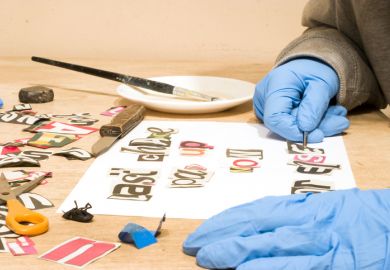Australia’s government has committed to legislate against contract cheating, in line with recommendations from the higher education regulator and an expert advisory panel.
The government said that the new law, expected to be presented to parliament next year, would prescribe “significant penalties” for providing or advertising commercial cheating services to higher education students – irrespective of where those services originated.
It said that the law, based on New Zealand’s approach, would probably rely on federal powers over communications, corporations, trade and commerce, territories, and “aliens”. Such a law would cover the majority of “likely commercial cheating situations”, it said.
However, complementary state and territory legislation would be needed to cover “regulatory gaps” such as cheating that is promoted by word of mouth and does not cross state borders or involve international students.
Other jurisdictions will be encouraged “to enact supporting measures as a follow-up”, the government said, in response to a report from the Higher Education Standards Panel.
The panel, which had been commissioned to provide advice on how to deter commercial cheating, had echoed the Tertiary Education Quality and Standards Agency’s call for specific legislation against the practice. It said that organised cheating represented “possibly the biggest current reputational risk to Australian higher education”.
But it said that legislating against the practice was “problematic” constitutionally, with Canberra lacking the power to “neatly or adequately” regulate the area – particularly in relation to domestic students and cheating that did not involve corporate entities.
“Cooperation with the states and territories appears to be the only basis on which the government could develop a comprehensive legal solution,” it said.
The government has also accepted the panel’s advice to appoint TEQSA to enforce the new legislation, and to develop a standardised statement of commitment to academic integrity that new students could be required to sign.
The government said that the “template” statement would “make clear the expectation to not misrepresent the work of others as their own, and the range of penalties that could apply if such dishonesty is identified”.
“The intent is that such a clear statement at the start of a person’s study journey will help set the benchmark for future actions,” the government’s response says. “Providers would be encouraged, on a voluntary basis, to adopt the statement for all students as part of induction processes.”
However, the panel rejected a proposal that a national register of contract cheating services is established as an “intelligence gathering” activity. “Simply maintaining the currency of information” would be an onerous task, it said, and proactive monitoring and “generalised good practice [were] likely to be as effective”.
Register to continue
Why register?
- Registration is free and only takes a moment
- Once registered, you can read 3 articles a month
- Sign up for our newsletter
Subscribe
Or subscribe for unlimited access to:
- Unlimited access to news, views, insights & reviews
- Digital editions
- Digital access to THE’s university and college rankings analysis
Already registered or a current subscriber?








